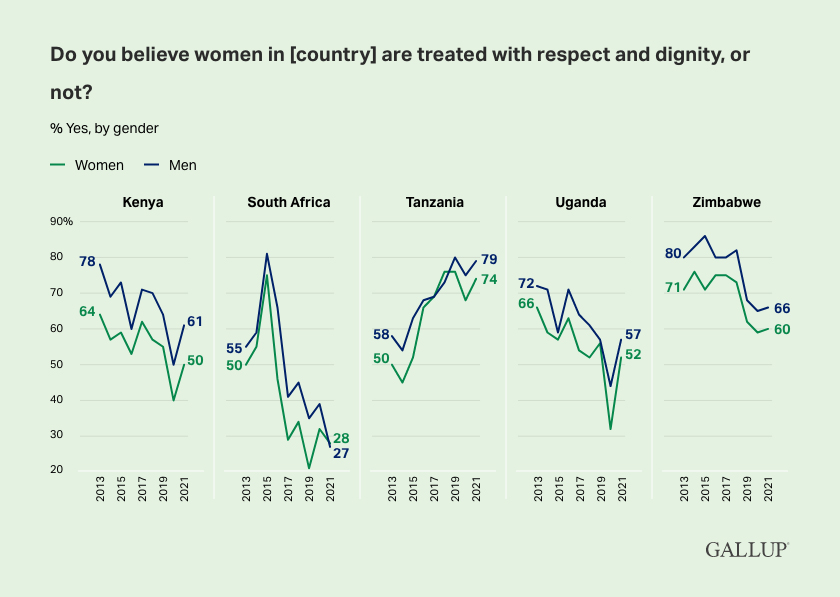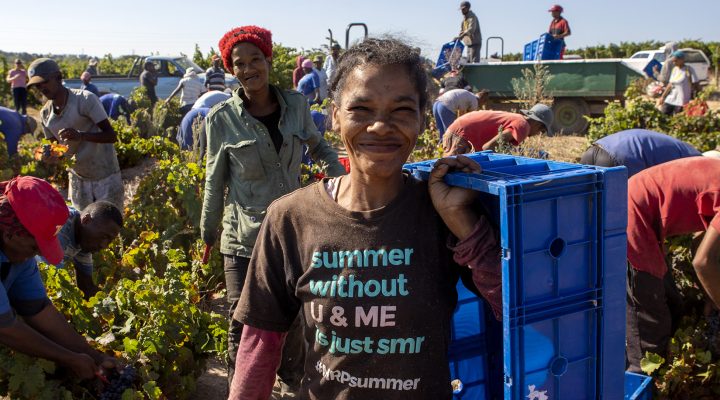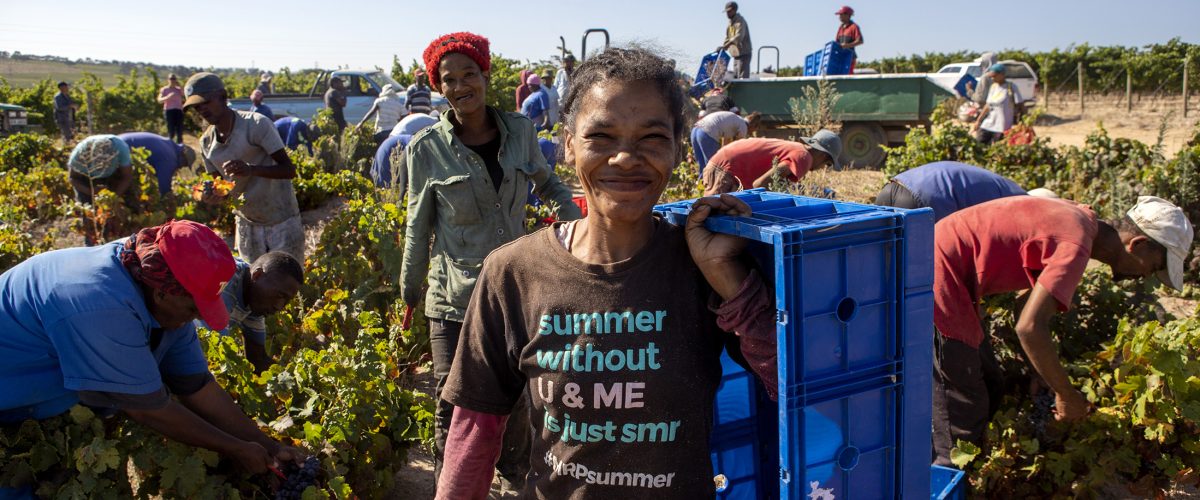Nearly three decades after the Beijing Conference on Women — where concerns about gender inequality were expressed — Africa still has a long way to go in bridging that gap, a new Gallup study has found.
The report, Gender Power in Africa, Analysis of the Imbalances that Shape Women’s Lives, was done in collaboration with Porticus, a philanthropic organization. It involved sampling the opinions of people in five African countries: Zimbabwe, South Africa, Tanzania, Uganda and Kenya.
The result shows females face more discrimination and are treated with less dignity and respect than their male counterparts. The research incorporates “findings from an analysis of recent quantitative data from the Gallup World Poll and international agencies like the U.N. and World Bank, as well as qualitative in-depth interviews with residents in each of the five countries.”
The challenges women face in those countries is attributable to a triumph of stereotypes that view women and girls as less important than men or boys and thereby burden them with additional or separate roles.
Interviews with participants in the countries in the Southern and Eastern parts of Africa show fundamental gender disparities and inequalities shape the lives of women there, as “women were generally seen to be given fewer educational and employment opportunities than men and to have less freedom in their ability to make decisions about their lives.”

A 23-year-old woman in Uganda shared her view of her society: “Even when the wife tells the husband she wants a job to start working rather than staying at home, the husband can’t allow her. He doesn’t give her freedom because she is the wife, and he married her. In my society, as a woman, they despise you and think you can’t do a thing.”
Another South African respondent explained: “I feel like, still to this day, women have to fight for their worth, not only in the society, not only in the workplace but also in the family. We still find women being treated as assets, as things that can be discarded of, as things to be owned, not as human beings with a mind, with intelligence, with emotions, and yeah, that’s very sad. … I always to this day find myself having to fight, especially in the industry that I’m in, the arts, where the industry is male dominant, especially in offices where change can be affected.”
Thus, “in all five countries studied, women were less likely than men to work full time for employers — jobs that are most likely to be in the formal sector,” the report states. “In Kenya, Tanzania and Zimbabwe, women were significantly less likely than men to have an account at a financial institution or mobile money service provider.”
The Gallup World Poll asked people several questions about their employment status.
The findings: “In 2021, women aged 15 to 50 in each of the five countries studied were less likely than men to say they worked full time for an employer — jobs most likely to be in the formal sector. The largest gender gap was in Kenya, where 29% of men vs. 17% of women said they worked full time for an employer.”
“Women are paid just more than half of what men receive for similar jobs.”
According to USAID’s 2020 gender analysis of Kenya, “Almost 50% of men and 30% of women are paid or waged employees. Women are paid just more than half of what men receive for similar jobs.”
Similarly, a 2018 ILO report found that, on average, women in Africa spend 3.4 times as much time as men on unpaid care and domestic work.
Related to that, many African women face the daily challenge of juggling caring for their families, the men in their lives and children, responsibilities that, in many instances, prove a stumbling block to their own progress. It is particularly burdensome when many such challenges, emanating from marriage, for instance, are forced on them.
“Child marriage is common in all countries under study,” the report says. “Child, early and forced marriage is one of the most harmful family practices. While CEFM affects both girls and boys, girls are much more likely to marry early than boys, and it is most potentially damaging to a girl’s development. Child brides often drop out of school and become pregnant, and these early pregnancies have a greater risk of ending in maternal or infant death. Child brides are also at greater risk of sexual violence, abuse, social isolation and exploitation.”
In this regard, “A 2022 UNICEF report provides recent estimates on the number of women aged 20 to 24 who were first married or in a union before the ages of 15 and 18. Though many countries in the region set the minimum legal age of marriage for girls at 18, UNICEF estimates 32% of young women in Eastern and Southern Africa were married before that.”
Women face these challenges even when there are laws in place meant to protect their interest. For instance, “despite legal stipulations to the contrary, child marriage remains common in all countries studied, affecting education and employment prospects for girls in particular,” the report notes.

Apart from tradition, cultural practices or societal expectations, religion is a contributing factor to the problems women face in Africa.
“The influence of religious traditions is more prevalent in Sub-Saharan Africa than in almost any other global region,” the report states. “Gallup’s 2021 World Poll found that the vast majority of adults regionwide — 93% — said religion was an important part of their daily lives, including 95% of women. Among four of the five countries studied, there was little difference between responses among men and women; the only exception was South Africa, where men were significantly less likely than women to say religion was important in their daily lives.”
Compounding the situation for many women in the countries reviewed is the violence they experience in the societies. Findings show that “intimate partner violence is common in many countries in Sub-Saharan Africa. According to 2018 World Health Organization data, nearly half of women in Uganda (45%), more than one-third in Kenya (38%), Tanzania (38%) and Zimbabwe (35%), and about one-fourth in South Africa (24%) report having experienced physical or sexual abuse by a current or former intimate partner in their lifetimes. While legislation against GBV exists in each of the five countries studied, enforcement agencies generally seem to lack accountability and consideration for survivors.”
While it is true that many men aid stereotypes and help perpetuate injustice against women in African societies, there are those who think otherwise, believing that closing the gender gap would lead to a better world for all.
“Notably, while female participants almost universally felt that girls should receive the same educational opportunities as boys, men also broadly supported this idea,” the report states. “While some male participants thought it was more important to educate boys — which they saw as logical since boys often grow up to be the breadwinner for their families — they were in the minority. A few explicitly said that educating girls would help the country progress toward its goal of gender equality.”


